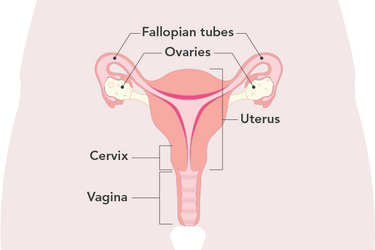Cervical cancer is one of the most preventable cancers. Regular cervical screening is the best way to protect yourself from cervical cancer.
What is the cervical screening test?
The cervical screening test checks the health of your cervix. A doctor or nurse will take a small sample from your cervix using a swab – like a pap smear – and have it tested for human papillomavirus (HPV).
HPV is a common virus that can change cells in your cervix. It’s the most common cause of cervical cancer.
Most people with HPV don’t have symptoms, which is why screening is so important.
If your test shows you have HPV, it usually takes 10 or more years for HPV to develop into cervical cancer. It is rare for an HPV infection to turn into cervical cancer.
Diagram of the female reproductive system

Do you need a cervical screening test?
You need a cervical screening test if you:
- are a woman or person with a cervix
- are aged 25 to 74
- have ever had sexual contact with another person, regardless of gender or sexual identity.
It’s important to have a test, even if you have been vaccinated for HPV. While the HPV vaccine is highly effective, it doesn’t prevent all HPV infections.
How often do you need to have cervical screening tests?
You need to have a test every five years between the ages of 25 and 74.
Screening every five years is very safe. This is because the old way of testing every two years (pap smear) only tested for changes in cervical cells. The new cervical screen tests for HPV, which can lead to changes in cervical cells. This helps to detect changes earlier.
Where can you have a cervical screening test?
Cervical screening tests are available at doctors’ clinics, health centres and family planning clinics.
How is the cervical screening test done?
If a healthcare provider takes a sample
If your healthcare provider does the test, you will need to take off your clothes below the waist and lie on your back with your knees apart. You will be given a sheet to cover yourself.
They will gently insert a speculum (duck-bill-shaped device) into your vagina and use a small brush to take a sample of cells from your cervix. This might feel strange, but it shouldn’t hurt. You can ask for a female healthcare provider if you prefer.
If you take your own sample (self-collection)
If you choose to take your own sample, you will need to do this at your health centre. Your healthcare provider will explain how to do the test. You can do it in private or ask them to help.
Self-collection involves inserting a swab into your vagina. You gently move the swab in a circular motion for 10 to 30 seconds. This may feel uncomfortable, but it shouldn’t hurt. Then you remove the swab from your vagina and place it back in the packaging provided.
Self-collection is just as safe and accurate as having a healthcare provider take your sample.
What happens after your test?
After your sample is taken, it is sent to a laboratory for testing.
If your test does not show HPV, you can wait five years for your next test.
If your test shows HPV, your healthcare provider will talk to you about what you need to do next. Your results will go to the National Cancer Screening Register (NCSR). This service will also send you reminders about when to have your next test.
When to see your doctor
See your doctor or healthcare provider if you’re not sure when your next cervical screening test is due.
If you have unusual vaginal bleeding, pain or discharge, see your doctor straight away. Note, self-collection is not recommended if you have any of these symptoms.
Ask your doctor about the HPV vaccine if you haven’t already had it.
Learn more about cervical cancer.
You can also find an Easy Read version of our Cervical Screening Test fact sheet.
© 2025 Jean Hailes Foundation. All rights reserved. This publication may not be reproduced in whole or in part by any means without written permission of the copyright owner. Contact: licensing@jeanhailes.org.au
